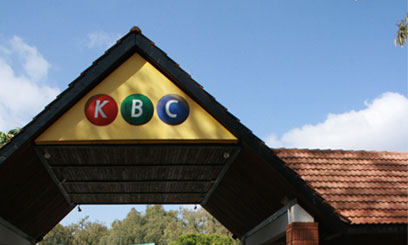Kenya Broadcasting Corporation (KBC), Kenya’s national broadcaster, is staring bankruptcy in the face after a Dubai-based businessman sued it demanding Ksh49 billion over a failed TV channel and an aborted digital migration partnership.
The suit could bankrupt the state corporation, which is struggling with a debt of Ksh45 billion arising from a loan it took in 1989. Given that the government will likely bail it out, this suit will leave the taxpayer with a huge external bill.
Mr Ajay Sethi of Channel 2 Group Corp is seeking compensation over the termination of a joint venture that was killed by KBC in March, 2009 ending what was supposed to be a 24-hour entertainment and sports channel, Metro TV. According to the Daily Nation, the state broadcaster used information from a feasibility study carried on the digital television market by Channel 2 to launch a distribution platform together with China’s StarTimes.
The arbitration papers are filed with London’s Lincoln’s Inn-based Essex Court Chambers, which specialises in commercial and financial litigation and arbitration.
Auditor General Edward Ouko in mid April 2016 declared Kenya Broadcasting Corporation (KBC) technically insolvent. Its operations depend upon financial support of the government and creditors. The Auditor General made the qualified opinion in his report to the National Assembly for the year ending June 2015. KBC lost Ksh5.34 billion in the last financial year 2012/2013 and Ksh5.5 billion in 2013-14, bringing its liabilities to Ksh46.73 billion, against its current assets balance of Ksh1 billion.
Senior government officials mentioned in the suit papers include former Minister of Information and Broadcasting, Mutahi Kagwe (now Nyeri Senator), his Permanent Secretary Bitange Ndemo, former Tourism minister Morris Nzoro as well as former senior KBC officials.
KBC is also accused of entering into a pact with a third party company as part of the digital migration. While the third party company is not mentioned in the suit, KBC owns 40 percent of Multichoice Kenya Limited which runs GoTV, while the rest of the 60 per cent is owned by Multichoice Africa.
Similarly, KBC holds shares in Signet, one of the companies fully licensed to carry out broadcasting signal distribution, under the new digital platform. Signet has 17 digital signal distribution sites and carries about 38 broadcasters.
The first deal was signed after Mr Sethi invited KBC officials to Dubai in September, 2005 to see the operations of Ajman TV, which he owned. He said KBC liked the channels idea and were looking at the “bigger picture, towards the introduction of digital technology in Kenya.”
After signing the agreement with KBC, dated September 20, 2005, Mr Sethi incorporated his company at the British Virgin Islands on September 29, 2005. It is not clear whether KBC entered into contract with a non-existent company.
[crp]
Mr Sethi now claims that KBC’s breach of their joint venture brought to an end his determination to venture into the East African market. KBC and Mr Sethi’s company had jointly incorporated Channel Two G Corporation (Africa) Limited to run the joint venture as per an agreement signed in May 2006 in which the Dubai company was to share revenue at the ration of 70:30. The joint venture was to end in August 2017.
KBC was supposed to provide some of the equipment, but some were found to be “inadequate”. As a result, the Dubai company obtained funds for the procurement of a new transmitter for Metro TV, staff, billboards and hired an advertising company.
In a letter dated March 2009, KBC said it terminated the venture because of programming and “poor financial performance”. But Mr Sethi says that this was caused by weak and unreliable signal.
“The joint venture company could not attract a sufficient audience to obtain, or keep, advertising revenue and contracts. Company staff became demoralised by their lack of success in selling advertising air-time,” says the papers. The joint venture had projected that by August 2017, it would have earned a profit of US$481.9 million (Sh48.2 billion).
Conflicts of interest
While terminating the venture, KBC accused Mr Sethi of misrepresenting himself that he had “capabilities, competence, expertise and financial resources” to run the station. “You have now sought to partner with a strategic partner by the name ETV of South Africa to manage the station without the consent of KBC,” said the letter of termination.
In June 2006 at Dubai’s Fairmont Hotel, one of Dubai’s luxury hotels, KBC and Mr Sethi’s Channel 2 held a press conference attended by Kenya’s then minister of Tourism Morris Dzoro and senior KBC officials after which a deal was struck, extended the agreement from five to 10 years with the digital migration component in mind.
At some point, KBC issued a public tender for the provision and installation of digital equipment for the Digital Terrestrial Television platform. Mr Oira, invited the Sethi group to tender too. The tender was later awarded to China’s Star Times which entered a digital television memorandum of understanding with KBC, which Mr Sethi considers a breach of their agreement.
Also >> Journalists to sue Nation Media over poor pay
KBC argues that it was entitled to terminate the joint venture agreement after Mr Sethi failed to provide films and other programmes in sufficient quantity. KBC Company Secretary Paul Jilani says that Mr Sethi knew that Metro TV had a 1kw transmitter at Limuru station and that this was the transmitter KBC would provide. He says that the decision to install a new 5kW UHF transmitter to broadcast Channel 2 was not taken to comply with any agreement.
Mr Jilani says that Channel 2 was unable to attract advertising due to poor programmes which he says had negative impact on viewing figures. He said the amount demanded by Mr Sethi as compensation for loss and damage is grossly inflated.
“To put these figures in context, ITV, a long established free-to-air commercial digital TV generated profits of about US$300 million last year,” he said.
[crp]


















































![Pula Co-Founders and Co-CEOs, Rose Goslinga & Thomas Njeru. Pula provides agricultural insurance and digital products to help smallholder farmers manage climate risks, improve farming practices and increase their incomes. [ Photo / Courtesy ]](https://businesstoday.co.ke/wp-content/uploads/2021/01/Pula-Co-Founders-and-Co-CEOs-Thomas-Njeru-Rose-Goslinga.jpg)




























































Leave a comment